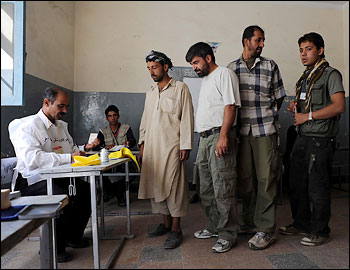Afghans Vote, Against Backdrop of Threats
Low Turnout in Many Areas Could Raise Questions About Legitimacy of Election


|
Discussion Policy
Comments that include profanity or personal attacks or other
inappropriate comments or material will be removed from the site.
Additionally, entries that are unsigned or contain "signatures" by
someone other than the actual author will be removed. Finally, we will
take steps to block users who violate any of our posting standards,
terms of use or privacy policies or any other policies governing this
site. Please review the full rules governing commentaries and discussions. You are fully responsible for the content that you post.
|
Friday, August 21, 2009
KABUL, Aug. 20 -- Defying Taliban threats to bomb polling stations and maim voters, millions of Afghans cast ballots Thursday in a presidential election that was relatively peaceful and orderly despite widespread predictions of violence and fraud.
The day was marred by reports of low voter turnout in many areas, however, which could complicate efforts to declare the results legitimate. With no official tabulations expected for several weeks and a runoff likely between incumbent Hamid Karzai and his top challenger, former foreign minister Abdullah Abdullah, Afghans face the prospect of a drawn-out period of political tension and uncertainty.
Officials said nine civilians and 18 members of the Afghan security forces were killed in scattered incidents of election-day violence, including a foiled attack on a police station in the capital. Officials said that they thwarted numerous suicide attacks planned for Kabul in recent days and that security was effective in major cities and towns.
In rural areas nationwide, more than 800 polling stations out of about 7,000 were closed because of security concerns, but there were no reports of major insurgent attacks. Taliban leaders had threatened to carry out suicide attacks against what they called a "sham" and "infidel" election, but the strikes did not materialize.
"The Afghan people dared rockets, bombs and intimidation to come out to vote," Karzai, who has led Afghanistan for 7 1/2 years, told reporters at his palace Thursday afternoon. "We regret the loss of civilian lives, but we are grateful for the sacrifices people made. It went very, very well."
International officials also expressed satisfaction with the election. "So far, every prediction of disaster has turned out to be wrong," Richard C. Holbrooke, the U.S. special envoy to Afghanistan and Pakistan, said during a tour of polling stations in Kabul.
U.N. spokesmen here congratulated Afghan officials for organizing the vote in an "extremely challenging environment" and said voters had clearly demonstrated their "desire for stability and development." More than 15 million people had registered to vote nationwide.
Nevertheless, a combination of fear and disillusionment with politics kept many people away from the polls, especially ethnic Pashtun voters in southern and eastern provinces where Taliban insurgents are a major presence.
There was much higher turnout and less violence in the northern provinces, which are dominated by other ethnic groups, potentially creating a regional imbalance in voting results and raising questions about the legitimacy of the election. Although there were no major complaints of fraud, international observers said it will take time to determine how many people voted and to what degree the voting was marred by fraud and violence.
"I think everyone has to guard against making judgments that 24 or 48 hours later may not hold," said Kenneth Wollack, president of the National Democratic Institute, speaking in Kabul late Thursday. He led a team of more than 100 Afghan and international election observers.
In some rural districts of Helmand, Kandahar and Logar provinces, which have been wracked by insurgent violence, very few people voted. In Kandahar city, however, officials said turnout was robust despite Taliban threats and the firing of 11 rockets. Zalmay Ayoubi, a spokesman for the provincial governor, said that one rocket killed three children but that most others did little damage.
In eastern Nangahar province, another heavily Pashtun region, several people waiting to cast ballots said their neighbors and relatives had refused to come out because the Taliban had threatened to cut off the purple-ink-stained finger of anyone who had voted.



 Why Do I Have to Log In Again?
Why Do I Have to Log In Again? Discussion Policy
Discussion Policy



